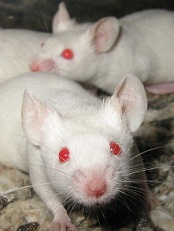User login

Photo by Aaron Logan
Increasing levels of a gut microbiome-derived metabolite could help prevent graft-versus-host disease (GVHD) after hematopoietic stem cell transplant (HSCT), according to preclinical research published in Nature Immunology.
For this study, researchers searched for alterations in the gut microbiome to see whether metabolites could impact outcomes after HSCT.
They found that levels of a metabolite called butyrate were significantly reduced in the intestinal tract of mice that received a transplant.
When the researchers increased butyrate levels in these mice, they saw a decrease in the incidence and severity of GVHD.
“Our findings suggest we can prevent graft-vs-host disease by bolstering the amount of the microbiome-derived metabolite butyrate,” said study author Pavan Reddy, MD, of the University of Michigan Comprehensive Cancer Center in Ann Arbor.
He and his colleagues found they could mitigate GVHD by administering butyrate to mice or by altering the composition of indigenous gastrointestinal microbiota so they produced high levels of butyrate.
The team noted that diet is another way to control butyrate production by the gut microbiome—specifically, through resistant starch such as that found in potatoes.
The researchers hope to begin a clinical trial later this year in which they will combine resistant starch with current methods of preventing GVHD to assess whether they can increase butyrate and reduce the incidence and severity of GVHD in HSCT recipients.
“This is a whole new approach,” Dr Reddy said. “The idea is to make the host cells stronger, to be able to withstand the assault of the donor immune cells while reducing the risk of infection or [disease] relapse.” ![]()

Photo by Aaron Logan
Increasing levels of a gut microbiome-derived metabolite could help prevent graft-versus-host disease (GVHD) after hematopoietic stem cell transplant (HSCT), according to preclinical research published in Nature Immunology.
For this study, researchers searched for alterations in the gut microbiome to see whether metabolites could impact outcomes after HSCT.
They found that levels of a metabolite called butyrate were significantly reduced in the intestinal tract of mice that received a transplant.
When the researchers increased butyrate levels in these mice, they saw a decrease in the incidence and severity of GVHD.
“Our findings suggest we can prevent graft-vs-host disease by bolstering the amount of the microbiome-derived metabolite butyrate,” said study author Pavan Reddy, MD, of the University of Michigan Comprehensive Cancer Center in Ann Arbor.
He and his colleagues found they could mitigate GVHD by administering butyrate to mice or by altering the composition of indigenous gastrointestinal microbiota so they produced high levels of butyrate.
The team noted that diet is another way to control butyrate production by the gut microbiome—specifically, through resistant starch such as that found in potatoes.
The researchers hope to begin a clinical trial later this year in which they will combine resistant starch with current methods of preventing GVHD to assess whether they can increase butyrate and reduce the incidence and severity of GVHD in HSCT recipients.
“This is a whole new approach,” Dr Reddy said. “The idea is to make the host cells stronger, to be able to withstand the assault of the donor immune cells while reducing the risk of infection or [disease] relapse.” ![]()

Photo by Aaron Logan
Increasing levels of a gut microbiome-derived metabolite could help prevent graft-versus-host disease (GVHD) after hematopoietic stem cell transplant (HSCT), according to preclinical research published in Nature Immunology.
For this study, researchers searched for alterations in the gut microbiome to see whether metabolites could impact outcomes after HSCT.
They found that levels of a metabolite called butyrate were significantly reduced in the intestinal tract of mice that received a transplant.
When the researchers increased butyrate levels in these mice, they saw a decrease in the incidence and severity of GVHD.
“Our findings suggest we can prevent graft-vs-host disease by bolstering the amount of the microbiome-derived metabolite butyrate,” said study author Pavan Reddy, MD, of the University of Michigan Comprehensive Cancer Center in Ann Arbor.
He and his colleagues found they could mitigate GVHD by administering butyrate to mice or by altering the composition of indigenous gastrointestinal microbiota so they produced high levels of butyrate.
The team noted that diet is another way to control butyrate production by the gut microbiome—specifically, through resistant starch such as that found in potatoes.
The researchers hope to begin a clinical trial later this year in which they will combine resistant starch with current methods of preventing GVHD to assess whether they can increase butyrate and reduce the incidence and severity of GVHD in HSCT recipients.
“This is a whole new approach,” Dr Reddy said. “The idea is to make the host cells stronger, to be able to withstand the assault of the donor immune cells while reducing the risk of infection or [disease] relapse.” ![]()